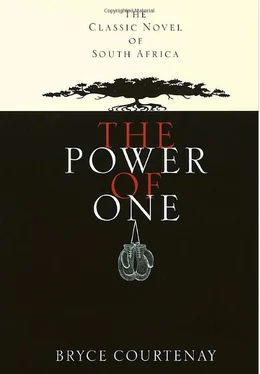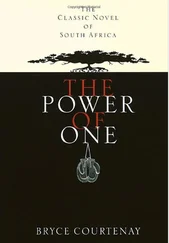Брайс Куртенэ - The Power of One
Здесь есть возможность читать онлайн «Брайс Куртенэ - The Power of One» весь текст электронной книги совершенно бесплатно (целиком полную версию без сокращений). В некоторых случаях можно слушать аудио, скачать через торрент в формате fb2 и присутствует краткое содержание. Жанр: Современная проза, на английском языке. Описание произведения, (предисловие) а так же отзывы посетителей доступны на портале библиотеки ЛибКат.
- Название:The Power of One
- Автор:
- Жанр:
- Год:неизвестен
- ISBN:нет данных
- Рейтинг книги:3 / 5. Голосов: 1
-
Избранное:Добавить в избранное
- Отзывы:
-
Ваша оценка:
- 60
- 1
- 2
- 3
- 4
- 5
The Power of One: краткое содержание, описание и аннотация
Предлагаем к чтению аннотацию, описание, краткое содержание или предисловие (зависит от того, что написал сам автор книги «The Power of One»). Если вы не нашли необходимую информацию о книге — напишите в комментариях, мы постараемся отыскать её.
The book is made to movie with the same name.
The Power of One — читать онлайн бесплатно полную книгу (весь текст) целиком
Ниже представлен текст книги, разбитый по страницам. Система сохранения места последней прочитанной страницы, позволяет с удобством читать онлайн бесплатно книгу «The Power of One», без необходимости каждый раз заново искать на чём Вы остановились. Поставьте закладку, и сможете в любой момент перейти на страницу, на которой закончили чтение.
Интервал:
Закладка:
Without thinking I had started to climb, skirting the rocks and the dark patches of scrub and thorn bush. In half an hour I had reached the summit and scrambling to the top of a huge, weather-rounded boulder I looked about. Behind me the hills tumbled on, accumulating height as they gathered momentum until, in the far distance, they became proper mountains. Far to my left an aerial cableway strung across the foothills into the mountains remained motionless, work had not yet started for the day. Below me, cradled in the foothills, lay the small town. It looked out across a vast and beautiful valley which stretched thirty miles over the lowveld to a slash of deep purple on the pale skyline, an escarpment which rose two thousand feet to the grasslands of the highveld.
It was the most beautiful place I had ever seen. The sun had just risen and was not yet warm enough to lap the dew from the grass, but it was sharp enough to polish the air. I could see the world below me but the world below could not see me. I had found my private place; how much better, it seemed to me, than the old mango tree beside the hostel playground. Above me, flying no higher than a small boy’s kite, a sparrowhawk circled, searching the quilted backyards below for a mother hen careless enough to let one of her plump chicks stray beyond hasty recovery to the safety of her broody undercarriage. Death, in a vortex of feathered air, was about to strike out of a sharp blue early morning sky.
Chimneys were beginning to smoke as domestic servants arrived from the black shanty town hidden behind a buttress of one of the foothills to make the white man’s breakfast. The sound of roosters, spasmodic when I had started my climb, now gathered chorus and became more strident and urgent as they sensed the town start to wake. Part of the town was still in the shadow cast by the hills, but I could see it was criss-crossed with jacaranda-lined streets. My eyes followed a long line of purple which led beyond the houses clustered on the edge of the town to a square of dark buildings surrounded by a high wall perhaps a mile into the valley. The walls facing me stood some three storeys high and were studded with at least a hundred and fifty tiny dark windows all of the same size. The buildings, too, were built in a square around a centre quadrangle of hard, brown earth. On each corner of the outside wall was a neat little tower capped with a pyramid of corrugated iron which glinted in the early morning sun. I had never seen a prison, nor had I even imagined one, but there is a race memory in man which instinctively knows of these things. The architecture of misery has an unmistakable look and feel about it.
My granpa, who was an early riser, would be out and about soon and it took no more than twenty minutes to clamber down the hill, back under the green canopy of mulberry trees and into the rose garden. He was cutting away at the arbour on the third terrace, snipping and then pulling a long strand of roses from the overhang and dropping it on a heap on the pathway. He looked up as I approached down the corridor of roses.
‘Morning, lad. Been exploring, have you?’ he snipped at another string of roses and pulled it away from the trellis. ‘Mrs Butt is an untidy old lady, if you let her have her way and don’t trim her pretty locks, she’s apt to get out of control,’ he announced cheerfully. I said nothing. Much of what my granpa said was to himself and asking questions was no use. I was soon to learn the names of every rose in the garden and Mrs Butt, it turned out, was the name of this particular cascade of tiny pink roses.
I pulled the lining of my shorts’ pocket inside out and carefully unclipped the large safety pin which held Mevrou’s doek. Crouching on the ground at the old man’s feet, I unknotted the grubby cloth to reveal Granpa’s shilling, the threepenny bit Hennie had given me on my departure from Kaapmuiden and my folded ten-shilling note. I removed Granpa’s shilling and once again knotted the cloth and pinned it back into the pocket lining of my trousers. ‘This is your change from the tackies, Granpa,’ I said, rising and holding the gleaming shilling out to him. He paused, holding the secateurs like a sword above his head. ‘Here, take it, it’s your shilling, isn’t it,’ I repeated. He reached down for the coin and dropped it into the pocket of his khaki trousers. ‘There’s a good lad, that will buy me tobacco for a week.’ I thought he sounded quite pleased so I took a deep breath and came out with it.
‘Granpa, where’s Nanny?’ He moved back to the roses and now he turned slowly and looked down at me. Then he walked the few paces to the steps leading up to the terrace and slowly sat down on the top step.
‘Sit down, lad.’ He patted the space beside him on the step. I walked over and sat down beside him. He removed his pipe from his pocket, tapped it gently on the step below him and a plug of ash fell from the pipe. He blew through the pipe twice before taking his tobacco pouch from his pocket and refilling it. My granpa was not one for hurrying things so I waited with my hands cupped under my chin. Lighting a wax match on his thigh, he started at last to stoke up, puffing away at the pipe until the blue tobacco smoke swirled about his head. For a long time we sat there, my granpa looking out at nothing, his pipe making a gurgly noise when he drew on it, and me looking at the roof of the house which had once been painted but now only had patches of faded red clinging to the rusted corrugated iron. Coming up the hill in front of the house I could hear a truck, its low gear rasping in the struggle to get up the hill, then a pause as it reached the top and slipped into a higher gear, relieved the climb was over.
‘Life is all beginnings and ends. Nothing stays the same, lad,’ my granpa said at last. Then he puffed at his pipe and seemed to be examining his fingernails which were broken and dirty from gardening. ‘Parting, losing the thing we love the most, that’s the whole business of life, that’s what it’s mostly about.’
Shit, I know that already, I thought to myself. Then my heart sank. Was he trying to tell me Nanny was dead?
He was doing his looking-into-nothing trick again and his pipe had gone out. ‘She was a soft and gentle woman. Africa was much too harsh a place for such a trembling little sparrow.’ With this he struck another match and touched it to his pipe. Puff, puff, swirl, swirl, puff, puff, gurgle, but he did not continue. While it didn’t sound a bit like big, fat Nanny, my granpa was always a bit vague about people and the sentiment seemed appropriate enough, so I waited patiently for him to continue. Taking his pipe from his mouth, he used it to indicate the rose garden around us. ‘I built it and planned it for her, the roses, to a rosebud, were the ones which grew in her father’s vicarage in her Yorkshire village, the trees too, elm and oak, spruce and walnut.’ He replaced the pipe in his mouth, but it had gone out again and he had to light it a third time. This time he cupped his hands around the bowl and gave it a really good stoking up so that at one stage his head disappeared completely behind the clouds of blue smoke. I had already observed that my granpa could waste a great deal of time with his pipe when he didn’t want to give my mother an answer or needed time to think. So I waited and thought it best to say nothing, though none of it made sense. Nanny, who discussed everything with me, had never once talked about the roses in the farm garden, and I knew for a fact that she came from a village in Zululand near the Tugela river. While she had often talked about the crops and the song of the wind in the green corn, of pumpkins ripening in the sun which were as big as a chief’s beer pots, and of the sweet tsamma melons which grew wild near the banks of the river, she had never, even once, mentioned anything about roses to me.
Читать дальшеИнтервал:
Закладка:
Похожие книги на «The Power of One»
Представляем Вашему вниманию похожие книги на «The Power of One» списком для выбора. Мы отобрали схожую по названию и смыслу литературу в надежде предоставить читателям больше вариантов отыскать новые, интересные, ещё непрочитанные произведения.
Обсуждение, отзывы о книге «The Power of One» и просто собственные мнения читателей. Оставьте ваши комментарии, напишите, что Вы думаете о произведении, его смысле или главных героях. Укажите что конкретно понравилось, а что нет, и почему Вы так считаете.












